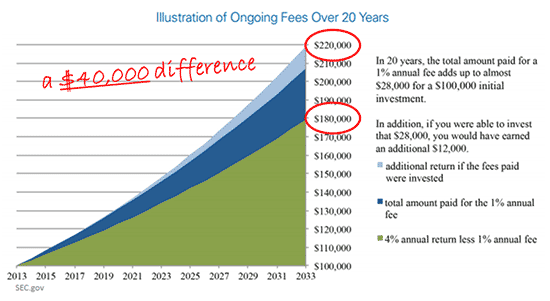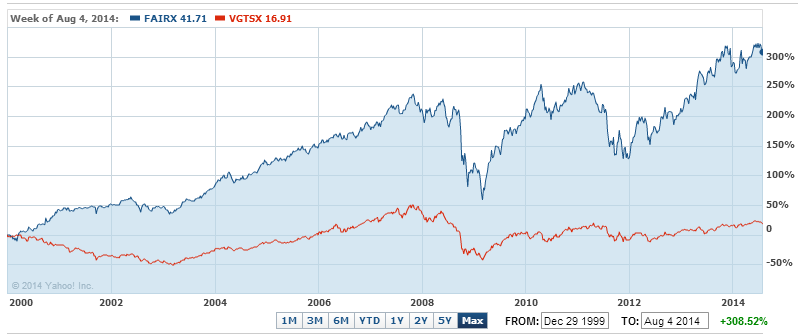The numbers are very clear when it comes to investing – the lower you buy, the higher you sell.
That's why we've focused on so many tactics that get you a "discount" on your investment. It's the best (and simplest) way to maximize upside. We've already talked about lowball orders, dollar-cost averaging, and buying puts – all very simple ways to buy lower and maximize your upside – and we'll be exploring even more of those in the weeks to come.
But there's one investment, one situation really, where you actually do want to pay more.
I know, I know. That's akin to financial heresy.
This is the only time you'll hear me tell you it's okay to pay a premium for something in the pursuit of Total Wealth.
Look at this to see why…
Why Lower Management Fees Are Not Always Better
I hear from plenty of folks – and frequently I might add – that they picked one investment alternative over another, strictly based on the lower fees they'll be charged.
So let's spend a minute first on the notion of fees. I totally get where critics have a problem with 'em. The math is very compelling.
Over 20 years, even a tiny 1% management fee adds up to nearly $28,000 on an initial $100,000 investment, according to the SEC. Worse, by not being able to invest that same $28,000, you would forego an additional $12,000 in income at 4% a year.
You can see quite clearly how this impacts your money in the following chart.

But what if you could flip that around in the name of profits?
Conventional Thinking About Fees Is Flawed
Here's the thing.
Conventional thinking about investment fees is flawed – not mathematically, but conceptually.
That's because the argument assumes that everything else is equal.
It's an offshoot of the efficient market hypothesis, which is in turn linked closely to the random walk theory first modelled by French broker Jules Regnault in 1863 and subsequently by Louis Bachelier as part of his PhD thesis in 1900 entitled, "The Theory of Speculation."
The work pioneered by Regnault and picked up by Bachelier was almost completely ignored until the 1950s when it was further studied by Paul Samuelson at the University of Chicago Booth School of Business. Eugene Fama picked it up around the same time and the rest, as they say, is history.
Most universities today teach some variation of the efficient market hypothesis or random walk theory. It's accepted as gospel, and not surprisingly much of Wall Street's work is based on it, including diversification and – you guessed it – fees.
Here's where it gets interesting, though.
The performance advantage you supposedly get from choosing low fee alternatives is generally put together by people who have an economic interest in getting you to buy off on the notion that the markets are efficient and that there is nothing to gain from outperformance a la Regnault, Bachelier and Samuelson… because they believe it can't be done.
We know that isn't true. If it were, you and I wouldn't be having this conversation.
Savvy investors can absolutely beat the markets if they know how to align with the trends, pick the right tactics, and control risk – all of which are core Total Wealth principles.
The legendary Jim Rogers, George Soros, Sir John Templeton, Warren Buffett, Doug Kass… I can think of 20 or more individuals off the top of my head who have made billions doing just that.
It's worth noting that I'm no longer the lone voice in the woods on this that I once was. The 2013 Nobel Prize in Economics was split three ways between Lars Peter Hansen, Robert Shiller and none other than Eugene Fama, who seemingly has come full circle from his work in the 1960s. Their work "proved" that savvy investors can and do get ahead.
And that brings me back to our conversation on fees.
Considering High Performers: When the Ends Justify the Fees
There's no doubt you want to keep fees under control. To be clear, I'm not telling you to ignore them. Failing to do so can be costly.
But ask yourself, would you dismiss paying more in fees if you got more performance for your money?
I wouldn't. Wall Street is a pay-to-play environment, meaning there's a direct correlation for how much money you pay for results.
You will see quite clearly that managers and funds with the cheapest fees are rarely, if ever, at the top of the rankings by either performance or risk.
| CHEAP FUNDS | Expense Ratio | Return over 10 years |
| Vanguard Dividend Inverse Fund (VDIGX) | 0.31% | 145% |
| T. Rowe Price Equity Index 500 (PREIX) | 0.28% | 107% |
| Fidelity Total Bond (FTBFX) | 0.45% | 76% |
| >Vanguard Total Intl Stock Index Inv. (VGTSX) | 0.22% | 73% |
| T. Rowe Price MD Tax-Free Bond (MDXBX) | 0.46% | 55% |
| LOW-RISK FUNDS | Expense Ratio | Return over 10 years |
| Fairholme Fund (FAIRX) | 1.02% | 132% |
| PIMCO Long-Term U.S. Government A (PFGAX) | 0.83% | 97% |
| T. Rowe Price U.S. Treasury Long-Term (PRULX) | 0.52% | 91% |
| Dreyfus U.S. Treasury Long-Term (DRGBX) | 0.72% | 89% |
| Nuveen Inflation Protected Securities A (FAIPX) | 0.83% | 40% |
| HIGH-PERFORMING FUNDS | Expense Ratio | Return over 10 years |
| T. Rowe Price Health Sciences (PRHSX) | 0.79% | 380% |
| T. Rowe Price Media & Telecommunications (PRMTX) | 0.80% | 314% |
| T. Rowe Price Global Technology (PRGTX) | 0.95% | 259% |
| Alger Spectra A (SPECX) | 1.30% | 252% |
| Alger Capital Appreciation A (ACAAX) | 1.26% | 214% |
Source: Yahoo! Finance
Take Fairholme Fund (FAIRX) and Vanguard Total International (VGTSX), for example. I know they're radically different funds, but I've chosen them deliberately to highlight my point.
Penny-wise investors might be drawn to Vanguard's absurdly low expense ratio of 0.22%, especially over Fairholme's expense ratio of 1.02%. But as you can see in the chart below, the Fairholme Fund (the blue line) has greatly outpaced the Vanguard Fund (the red line) over the last 15 years, with a 300% gain vs. about 25%.

Source: Yahoo! Finance
Kinda puts a different spin on things, doesn't it?
If this is the first time you've thought about the tradeoff I'm sharing with you today, you're not alone. Even brokers don't understand what I am explaining to you, and frankly, Wall Street likes it that way. If the erroneous assumption that cheap fees are better gets more investors to hand over their money, they'll gladly take it because it boosts their top line.
The situation is much the same with exchange-traded funds (ETFs).
It's a widely held myth that ETFs are always cheaper than mutual funds when it comes to fees. Commonly cited reasons include lower operational expenses from their passive nature, a lower administrative burden, and no 12b-1 fees associated with annual marketing. Therefore, the implication is that they must be "better" investments. But that's not always true either.
| Ticker | ETF | Expense Ratio | YTD Return* |
| GASL | Daily Natural Gas Related Bull 3x Shares | 0.95% | 68% |
| XLU | FlexShares Quality Dividend Index Fund | 0.18% | 19% |
| XLE | SPDR Energy Select Sector Fund | 0.16% | 14% |
| XLV | Select Sector SPDR Health Care | 0.16% | 11% |
| VWO | Emerging Markets ETF | 0.15% | 6% |
*YTD Return as of 11/16/2014
Source: ETF Database (etfdb.com)
At this point, you may be thinking,"So if you're telling me that low fees may not be all they're cracked up to be, how do I know when high fees are worth it?"
I've got you covered. There are actually two situations:
- 1) When you are seeking an extremely specialized investment to fill a specific role in your portfolio; and
- 2) When a manager can prove he or she is worth it.
And I'll be back in an upcoming column to talk about those things in greater detail.
In the meantime, though, if you find yourself tempted to make a "cheap" investment, ask yourself if the savings are really "worth it," given what you want to accomplish.
The answer may honestly surprise you.
